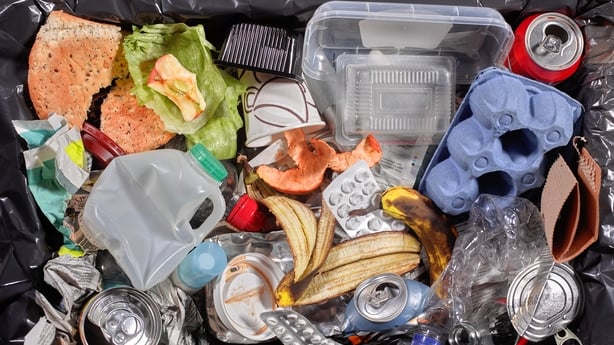Ireland is not on track to meet mandatory EU recycling targets that apply from 2025 onwards as waste generation levels continue to rise, according to a new report by the Environmental Protection Agency (EPA).
The EPA's Circular Economy and Waste Statistics Highlights Report 2021 concluded that "the continued high levels of waste generation coupled with stagnating recycling rates mean that it is now very unlikely that Ireland will meet mandatory EU recycling targets for municipal, plastic packaging and total packaging".
The report showed that just under 28% of plastic packaging was recycled in 2021, with 70% being treated by incineration and 2% by disposal.
It found that recycling rates for municipal waste, which is produced in household and commercial settings, remained unchanged at 41%.
It said 41.5 % of this type of waste was treated by energy recovery through incineration and 16% was disposed in a landfill.
The survey also said that packaging waste rose by 9% to 1.2 million tonnes in 2021, while packaging recycling decreased by 4%.
Following the reopening of the construction sector in mid-2021, construction and demolition (C&D) waste increased by 10% to 9 million tonnes, according to the EPA.
According to EU targets, municipal waste has a recycling target of 55% by 2025, recycling of packaging waste must reach 60% by 2025 and plastic packaging must reach a recycling target of 50% by 2025.

Ireland's economy remains linear with waste generation continuing to rise while recycling rates are not keeping up with the increasing levels of waste generation, it said.
Director of the EPA’s Office of Environmental Sustainability David Flynn said Ireland must fast-track its transition from a linear to circular economy that permits materials, such as packaging, to be used again and again allowing waste to be minimised.
Mr Flynn said: "We live on a resource-finite planet and resource extraction causes greenhouse gas emissions, biodiversity loss and water stress.
"To reduce these impacts, we must accelerate our transition from a linear economy to a circular, more resource-efficient economy.
"Right now, we need to focus on avoiding waste. That means reusing construction waste materials where possible, becoming better at segregating our municipal waste and vastly improving the recycling of packaging materials."
The report also found that "Ireland remains heavily reliant on export for the treatment of several key waste streams".
According to the EPA’s findings, 38% of municipal waste was exported for treatment in 2021, including 382,000 tonnes of residual waste exported for energy recovery through incineration.
It also said 69% of packaging waste was exported for treatment.
Programme Manager of the EPA’s Circular Economy Warren Phelan said that "Ireland is overly reliant on the export of waste for treatment and we are vulnerable to shocks and changes in international markets".
"We do not have enough facilities for the treatment of non-hazardous and hazardous waste which are missed opportunities to capture the energy and economic value of these wastes," he said.
"This is something we really need to get on top of and try to manage our own waste closer to home," he added.
Speaking to RTÉ's Morning Ireland, Mr Phelan said there will an accelerated roll out of the organic waste bin from early next year and that this would help segregation of waste which is key to driving recycling, he explained.
The report also found that 69% of Irish households had access to a brown bin in 2021, which is an increase of 5% nationally compared to 2020.
Hazardous waste generated in Ireland decreased by 16% in 2021, it said.
The EPA said this was due to the reclassification of Incinerator bottom ash (IBA) as a non-hazardous waste in 2020, reduced dredging activities at Dublin Port and the termination of activities at Limerick Gas Works in 2020.
To address the issues raised by the report, the EPA has called for an improvement in waste segregation by businesses and householders to ensure waste is deposited in the correct bin, a reduction in the country’s reliance on exporting waste, improvement in waste prevention especially in the C&D sector, full implementation of the Circular Economy Plan and a roll-out of the brown bin service to all customers.
Speaking on his way into the Cabinet, Minister for the Environment Eamon Ryan said that "we have to increase our recycling" but he said they the 'Waste Action Plan for a Circular Economy' published in 2020 "will help us get back on track".
He said there were "a lot of measures coming" including the deposit refund scheme that comes into effect in February, and he highlighted efforts to put the responsibility back on waste producers "making sure we tackle waste at source and make everything recyclable, all the plastics".
"It's never too late," he added.

